Chem Soc Rev—growing stronger
Abstract
Welcome to the first issue of Chem Soc Rev for 2011. This Editorial showcases the journal's recent successes and looks forward to exciting developments in the year ahead.
Quality and quantity: a winning combination
Chem Soc Rev's impact factor (ISI®, 2009) enjoyed another rise, leaping by over 15% to 20.086 (Fig. 1). The journal also retains its position at the top of the Immediacy Index table for general chemistry review journals, with a 2009 value of 5.314.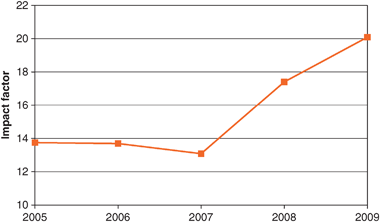 | ||
| Fig. 1 Growth in Chem Soc Rev impact factor. | ||
In 2010 we published more articles than ever before, a staggering 175 tutorial reviews and 121 critical reviews (Fig. 2). We now publish almost three and a half times as many reviews as we did in 2005 and significantly more than our competitors. But what do these numbers actually mean?
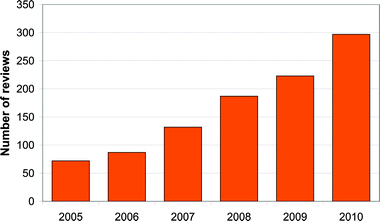 | ||
| Fig. 2 Growth in number of reviews published in Chem Soc Rev. | ||
Firstly, quality. Our readers can be sure that when they open a copy of Chem Soc Rev the reviews they are reading are among the most topical and high quality in the chemical sciences.
Secondly, choice. Because we're publishing more content, readers have a greater choice of high quality articles to select from. There's something for everyone.
And thirdly, visibility and impact. Authors know that publishing in Chem Soc Rev offers them the opportunity to make a real impression within the chemical science community.
Chem Soc Rev's continuing success would not be possible without the support of a great number of people. Thank you to all our authors, referees, readers and world-class Editorial and Advisory Board members—we hope we can continue to rely on your support in 2011.
Fostering collaborations
In June 2010, we travelled to China with ten Chem Soc Rev Editorial Board members to give invited lectures at the Chinese Chemical Society congress in Xiamen and also held an Editorial Board meeting (Fig. 3). Following the congress, we travelled on to Fudan University, Shanghai, and Beihang University, Beijing, to take part in the very first Chem Soc Rev Symposia. The symposia featured talks from the Editorial Board members plus invited local speakers and were hailed as a great success, both in terms of scientific dissemination and forging new international collaborations. On behalf of the Editorial Board and Editorial Office, we would like to sincerely thank everyone involved in the organisation of these symposia for their help and hospitality.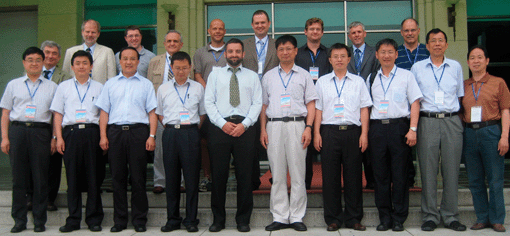 | ||
| Fig. 3 The Chem Soc Rev Editorial Board with heads of chemistry departments from leading Chinese universities. | ||
The increased links between Chem Soc Rev and China have resulted in a big rise in the number of reviews submitted and published by Chinese authors. These now represent 10% of our content. We are proud that Chem Soc Rev is a truly international journal, representing the highest quality science and scientists from around the globe (Fig. 4).
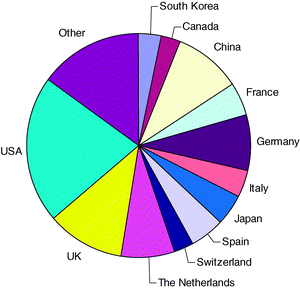 | ||
| Fig. 4 Geographical make-up of Chem Soc Rev in 2010. | ||
Board changes
Two Editorial Board members—Professors Jon Preece and Claudio Zannoni—completed their terms of office in 2010, and receive our warmest thanks for their substantial contributions to the development and success of Chem Soc Rev.We would like to extend our special thanks to Professor Wilhelm Huck, who retired as Editorial Board Chair in 2010. Wilhelm served as the Chair for three years, over which he contributed immensely to the positive growth in impact, quality and submissions. He has recently moved from Cambridge to Radboud University Nijmegen in the Netherlands and we wish him every success in his new position.
We are delighted to announce three new positions on the Chem Soc Rev Editorial Board. Following Wilhelm's retirement, Professor Dirk Guldi accepted the role of Editorial Board Chair. Dirk, who has been an Editorial Board member since 2007, is one of the world-leading scientists in the field of charge transfer and nanocarbons and we look forward to continued success for Chem Soc Rev under his guidance.
Particularly exciting for 2011 are the appointments of Chem Soc Rev's first Associate Editors. Effective from 1st January, Professors Philip Gale and Douglas Stephan will commission and handle synopses and reviews in the areas of supramolecular, macrocyclic and coordination chemistry (Phil) and inorganic and organometallic chemistry, catalysis and other related areas (Doug). Phil has been a very active member of the Editorial Board since 2005, including acting as a guest editor for the recent Supramolecular Chemistry of Anionic Species themed issue. Doug has only recently joined the Editorial Board but is well known as a leading expert in his field and we are thrilled both he and Phil have accepted these exciting new roles.
Themed issues
In 2010 we published six themed issues covering some of the most topical areas of the chemical sciences: From Microfluidic Application to Nanofluidic Phenomena; Click Chemistry; Conducting Polymers for Carbon Electronics; Peptide- and Protein-Based Materials; Supramolecular Chemistry of Anionic Species; and In-situ Characterisation of Heterogeneous Catalysts.The good news is that 2011 promises to be just as exciting. As a taster, early in the year we'll be publishing an issue on hybrid materials, guest edited by Professors Clément Sanchez (University of Pierre and Marie Curie, Paris, France), Susumu Kitagawa (Kyoto University, Japan) and Kenneth Shea (University of California, Irvine, USA). Later in the year, we'll be publishing a molecule-based magnets themed issue guest edited by Joel Miller (University of Utah, USA) and Dante Gatteschi (University of Florence, Italy). Keep an eye on the Chem Soc Rev blog for announcements about our other forthcoming themed issues.
Rewarding success
Congratulations to Professors Shu-Hong Yu (University of Science and Technology of China, Hefei, China) and Gerard Parkin (Columbia University, New York, USA), the winners of the 2010 Chem Soc Rev Emerging Investigator and Lecture Awards respectively.Nominations for the 2011 awards close on 31st January and the winners will be announced shortly afterwards. For more information, please contact the Editorial Office or visit the Chem Soc Rev blog, selecting the ‘Awards’ category.
Tell us what you're thinking
We're anticipating that 2011 will be a really positive and exciting year for Chem Soc Rev. As well as six highly topical themed issues, we will be publishing a whole host of quality reviews from international experts. Quality is, and always will be, the key to the success of the journal and we are delighted to be able to reward success through the Chem Soc Rev awards, plus a number of student poster prizes. We'll be representing the journal at a number of conferences throughout 2011 and we hope to meet as many of our authors, readers and referees as possible.We'll also shortly be appointing another Associate Editor and some new Editorial Board members. You can keep up-to-date with these developments and more, by following us on Twitter (http://twitter.com/chemsocrev), the Chem Soc Rev blog (http://blogs.rsc.org/cs), the journal homepage (www.rsc.org/chemsocrev) and, of course, our monthly e-alerts.
Chem Soc Rev is your journal and so we'd love to hear your feedback and ideas. Please contact us at E-mail: chemsocrev-rsc@rsc.org.
With our best wishes for a very happy and successful 2011,
 Professor Dirk Guldi, Chair
Professor Dirk Guldi, Chair
 Dr Robert Eagling, Editor
Dr Robert Eagling, Editor
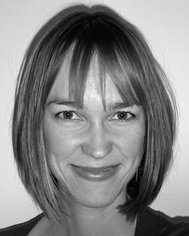 Joanne Thomson, Deputy Editor
Joanne Thomson, Deputy Editor
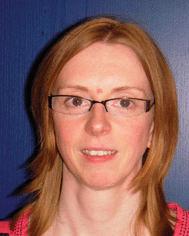 Dr Claire Darby, Senior Publishing Editor
Dr Claire Darby, Senior Publishing Editor
News from RSC Publishing
Quality and growth continues
It's quality that really matters at RSC Publishing. And the 2009 Journal Citation Reports® proved that our quality is better than ever as our average impact factor rose from 4.9 to 5.4. It's an impressive figure, especially when compared with the average for a chemistry journal of 2.4.But we don't rely on just one or two titles to boost our average. It's our entire collection that counts: of the top 20 journals in the multidisciplinary chemistry category, 25% are from RSC Publishing; and 90% of our titles have an impact factor over 3.
Our list of titles continues to grow: Food & Function and Catalysis Science & Technology are the latest titles to join our expanding portfolio. Plus, the number of articles we've published has increased by 74% in the last 2 years alone. We remain committed to providing a world-class publishing service to our authors, and delivering cutting-edge chemical science to readers throughout the world.
The impact factor and article growth figures provide a clear indication that more researchers than ever before are recognising journals from the RSC as a key resource to access the very best research.
2011 Books
With steady front-list growth and cutting-edge content, delivering excellence and authority, the RSC is one of the world's leading chemical science print and online book publishers.Nearly 1000 eBooks equating to one third of a million pages, the RSC eBook Collection delivers outstanding online research and opinion in a multitude of areas of the chemical sciences. Nine new RSC eBook Subject Collections offer additional flexibility.
With over 90 new print titles planned for 2011, including: second editions of seminal texts; and new RSC Polymer Chemistry and RSC Metallobiology series launching, our contribution to chemistry collections worldwide is diverse, topical and high impact. Expect another first class collection of best selling chemical science titles in 2011.
NEW RSC Publishing Platform
Access one million journal articles and book chapters in one simple integrated search.The new RSC Publishing Platform has been developed in consultation with the international scientific and librarian community. Together we have identified the best and most valued interface and features that connects you with the highest quality scientific research. With one single search box, easily access our books, journals and databases for students, academics, researchers, scientists and professionals.
Free online access
Free online access is available to all our newest journals, and more—all you need to do is register for an RSC Publishing personal account. Then, when you are logged in, you will be able to access all our free content. Currently this includes:• all content of our newest journals for the first 2 volumes
• any articles that are part of a special free access promotion (e.g. ‘hot’ papers, web themed issues, etc.)
• all journal content published more than two years ago (dating back to 1997)
• a sample chapter from each book in the RSC eBook Collection
With your username and password you can access the free content any time, any place—all you need is internet access. Register at www.rsc.org/personalregistration.
If your institution is a current customer with IP registered, you will be able to access all free content. Other institutions can apply for free online access to our newest journals using our online form: www.rsc.org/freeaccess.
ChemSpider
Have you heard about the RSC's award winning chemical structure and text based search engine—ChemSpider? It's FREE!ChemSpider provides access to:
• millions of chemical structures
• an abundance of additional property information
• tools to upload, curate and use the data
• a multitude of other online services like the RSC Publishing Platform
ChemSpider is one of the richest single sources of structure-based chemistry information.
Visit www.chemspider.com (for mobile devices: cs.m.chemspider.com).
RSC 2011 conferences and events
As a learned society hosting more than 300 international conferences and events, the following have been outlined as areas you may find of interest. Visit www.rsc.org/ConferencesAndEvents to view the complete schedule of events for 2011.EICC-1: First EuCheMS Inorganic Chemistry Conference, Manchester, UK, 11–14 April
6th International Symposium on Macrocyclic and Supramolecular Chemistry (6-ISMSC), Brighton, UK, 3–7 July
10th International Conference on Materials Chemistry (MC10), the flagship event of the Materials Chemistry Division, Manchester, UK, 4–7 July
Challenges in Renewable Energy (ISACS4), Boston, USA, 5–8 July
22nd International Symposium: Synthesis in Organic Chemistry, Cambridge, UK, 11–14 July
Challenges in Chemical Biology (ISACS5), Manchester, UK, 26–29 July
Challenges in Organic Materials & Supramolecular Chemistry (ISACS6), Beijing, China, 2–5 September
International Year of Chemistry 2011
On request by UNESCO, the UN has proclaimed 2011 as the International Year of Chemistry (IYC) and has asked IUPAC to coordinate the events. The IYC is to increase the public appreciation of chemistry in meeting world needs; to encourage interest in chemistry among young people; and to generate enthusiasm for the creative future of chemistry (see: http://www.chemistry2011.org/).The RSC enthusiastically endorses the IYC 2011, supporting this important initiative through a series of events and activities.
| This journal is © The Royal Society of Chemistry 2011 |
